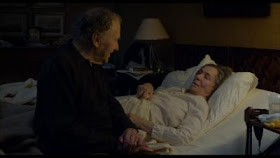Amour is a film which leaves an indelible impression upon the viewer. It is a film which provokes discussion amongst those who watch it, and will no doubt continue to divide opinion for years to come. Amour is both a stunningly beautiful and yet ultimately dark film. Unsurprisingly it garnered 2 Baftas and 5 Oscar nominations, and a Cannes Palme D'Or.
Jean-Louis Trintignant and Emmanuel Riva lead the cast as Georges and Anne Laurent, an elderly French couple, who are both retired music teachers in their late 80s. Their acting is spellbindingly brilliant, and the characters they create in their delivery of a 'difficult' story are both completely convincing, and emotionally engaging. I have seen too many films in which wooden or melodramatic acting has left me disengaged, and disinterested in the fate of the characters. Trintignant and Riva are the opposite of this, as the elderly couple negotiate joy, pain, sorrow, tenderness and rage; they do so, so with such depth and subtlety that I for one couldn't take my eyes off the screen for a second. It is sadly unusual to see elderly people expressing deep affection,
tenderness and love in films. Perhaps Hollywood is especially guilty in this regard; and it takes an Austrian film-maker, working in French to do so. Hollywood tends to think that love is the exclusive preserve of the smooth-skinned and fertile; whereas the real world contains people like Georges and Anne Laurent; life-long lovers and inseparable friends who gently and tenderly help each other with their daily tasks.
The film is brilliantly shot, and virtually every scene takes place in their apartment. The viewer feels completely drawn in to both the characters and the place. The camera's detailed studies of the faces of both Georges and Anne, are hugely impressive; and only add to the power of the performances by Tritignant and Riva.
Central to the story is the stroke suffered by Anne Laurent, in front of her husband. Riva is just superb, in her transmission of the strange combination of physical adjustment, fear, sadness and dignified resilience. Alongside her, Tritignant is wonderful as the husband both sorrowful at his wife's debilitation, but yet stoical in doing everything he can to help her recover as much as is possible. One scene I found especially moving was when George helps Anne with her recovery physio, working to try and coax life and response from her reluctant limbs.
Why then, is this a dark film? The reason is that as the story develops, George receives no help from family, friends, neighbours or the state and as he is left as the sole carer for Anne, and begins to personally unravel. Anne expresses her desire to refuse water and die, but he persists with his dogged caring regime, whilst internally disintegrating, to the point where he slaps his wife and collapses in regret. This emotionally jarring scene rams home the message that as the patient, Anne's physical deterioration is matched by Georges, her carer's, parallel psychological descent.
Finally, in a complex and difficult emotional scene, George grabs a pillow and smothers his wife; scatters her body with flowers and runs away. The viewer is left with a tangled sense of relief that Anne's suffering has come to an end, but horror at the way in which it has occurred; involuntary euthanasia - which is murder. There is also the acute sense that somewhere off-screen, Georges' psychological torment has only just begun.
The film has received differing reviews. While there seems to be unanimity about the undoubted quality of the cinematography and the acting; the film's moral message has caused some consternation because the film seems to be promoting euthanasia as the final act of love: "Amour". The film delivers a mighty amount of angst and emotional recoil from "the slap" scene; but appears to invite the viewer to share in the idea of euthanasia as a 'good ending'.
Margaret Morganroth Gullete, in her insightful review of 'Amour', for The Guardian writes:
‘One of the implicit convictions of the film is that a carer – even one as assiduous as Jean-Louis Trintignant's Georges – will crack under the strain of caring for a stroke victim… yet the circumstances shown in Amour are highly unusual. Money is no object for this couple. The carer has no pressing health issues of his own. He is also a man. And, though highly educated, he is a man who apparently has never received any advice about caregiving.’
This set of circumstances, she argues, is rather contrived:
‘Carers are now advised to arrange respite care: to get out, eat properly, enjoy a social life. It's understood that their own health and mental wellbeing is at stake. As well as this, Georges could easily have secured more help from other agencies… a daughter better educated about disability might have said words of love to her mother, and persuaded her – while it was still possible – to go out for tea, out in her wheelchair, to visit a friend. The family doctor, who makes house calls, could certainly have provided adequate pain medication for Anne; morphine could have eased her passing. Georges had more compassionate alternatives available to him than smothering his wife with a pillow.’
P.J. Saunders goes further, (perhaps his argument is in breach of Godwin's Law), as he draws a parallel between Amour and the German film Ich klag an, which was used in 1941 as a way of making German public opinion sympathetic to euthanasia, as a prelude to the killing of significant numbers of sick and disabled people. However, one need not draw (or endorse) such an extreme parallel to Amour, to be deeply concerned about the moral undercurrent behind the film.
Finally 'Amour' is a brilliant piece of film-making containing simply stunning acting, but it is harnessed to deliver a dubious moral message.





No comments:
Post a Comment